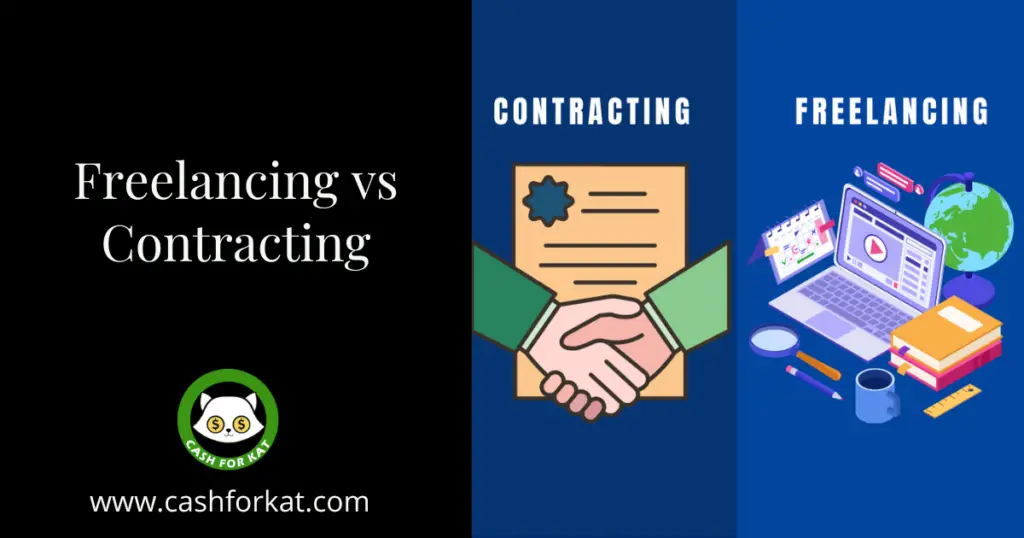
If you’re a freelancer, you might be wondering what you can do with your money as it grows. If you find your feet early, it’s going to take some time to consider what to do with it. You want to be smart about your cash and as it grows, putting it somewhere is important.
As a freelancer, you have the same ability to learn how to invest your money that you do have and grow your savings. Articles from people such as Jose Ernesto Batres Gonzalez can be super helpful when looking to invest in helping your future. Taking a look at as many sources as possible will help.
But what is the difference between freelancing and contracting? Let’s take a look!
What Is Freelancing and Contracting?
As of late, freelance and contract work have become increasingly popular forms of employment. Their popularity is due in part to the flexibility offered in these roles. Depending on your preferences and the job, either could be beneficial. However, it’s important to understand the key differences between contracting and freelancing in order to make an informed decision!
What Is a Freelancer?
Simply, a freelancer is a self-employed individual who is not affiliated with companies or agencies. Notably, people who are in the freelance business operate on their own by creating services and offering them to clients through different online platforms and social media.
Freelancers are in charge of choosing their own working schedules and locations. Usually, there are no limitations to this as long as your work is done by the given deadline. Freelancing also offers a lot of opportunities for development and growth, which is why freelancing is a great way to invest in yourself and your knowledge.
Freelancers are also responsible for taking out taxes on their own. They also don’t get the typical contract perks most workers get when signing onto a job such as health insurance or a 401k plan.
Pros
- Remote work
- Option to choose your own work schedule
- More freedom
- Ability to develop new skills and knowledge
- Create a healthy work-life balance
- Earn decent amounts of money
- Reach financial security
- Grow your network
Cons
- Getting started can be hard
- Inconsistent workload
- Constant hustling for new gigs
- No paid time off, maternity leave, or holidays
- No contract perks (healthcare, 401, etc.)
What is a Contractor?
A contractor is a self-employed temporary worker hired by companies and agencies for various projects. Typically, independent contractors have one client, and they tend to look for long projects that are paid once the project is complete.
They operate similarly to freelancers, however, they often have working hours and a set in-office location. There are many different types of independent contractors out there, but a common field would be roles like IT.
Like freelancers, contractors are also responsible for paying their own taxes
Pros
- You get to be your own boss
- You have control over the projects you accept
- You can have long-term projects
- Flexibility in how much you work
- Bigger sense of security
Cons
- You’re responsible for paying taxes, health benefits, and insurance
- You need to invest in your own equipment
- Possible workload gaps
Freelancing vs. Contracting
| Freelancing | Contracting |
| Self-employed, responsible for paying taxes | Self-employed, responsible for paying taxes |
| Can be set up as a limited company or sole trader | Can be set up as a limited company or sole trader |
| Typically works for multiple clients on a per-hour or per-day basis | Typically works for one client at a time, having full-time shifts and working on projects for a long period |
| Generally works remotely from home or anywhere in the world | May work from home or office depending on the client’s needs |
| Common in creative industries, social media, and marketing | Common in the IT industry |
What Are The Main Differences Between Freelancing and Contracting?
The main difference between freelancing and contracting stems from a few key elements. To start, contract workers typically enter into agreements with clients that last a set amount of time (ranging from weeks to months), while freelance workers are hired on a per-project basis.
Additionally, most contractors may receive benefits like paid holidays while freelancers do not.
Below is a list of the most significant differences between freelancing and contracting.
Hiring Process & Accepting Clients
Freelancers mainly exist in creative fields like marketing, writing, social media, and so on. That being said, freelancers are often reaching out to clients and vice versa. A case-by-case agreement is made and once the work is done, the client pays the freelancer out directly without any agencies or companies interfering. An example of this is a freelance writer reaching out to a publication and getting paid to write a single article.
On the other hand, independent contractors get hired through agencies or vendors who represent a particular company. At the end of the month, the agency or vendor pays out the contractor, so there’s typically no direct contact with the company.
Freelancing and contracting are also very different when it comes to accepting clients. Freelancers typically find gigs through freelancing websites and work for multiple people at a time, while contractors usually have one long-term client. Contractors can have multiple clients, but their work typically requires full-time hours, which is why having two clients at a time may be impossible.
Work Schedule & Project Period
Freelancers are in charge of choosing their own work schedules. Although they receive deadlines, it’s entirely up to them to decide when they want to work. Because of that, freelancers get to set their own working hours and days off without the need to consult anyone else.
On the other hand, the schedule of an independent contractor is similar to that of someone in a 9-to-5. Although contractors get to choose their projects these typically have strict set working hours that are chosen by the company.
Another big difference between freelancers and contractors is the project period. Most freelance projects are short-term, and the freelancer moves on to another client after the gig is done.
However, independent contractors typically work on long-term projects, giving them more job security than freelancers. These types of projects are usually longer than 6 months.
Setting Rates
Freelancers are in charge of setting their own rates for the services they offer and can typically decide if they want to be paid per hour, per day, or per project. They can also negotiate rates with their clients and request payment type which is typically not something contractors can do.
Although some independent contractors can set their rates, most agree to one that’s set by the agency or vendor that’s contacted them. If the contractor would like to negotiate the set rate they’ll have to speak to the agency, which can often be inconvenient.
The Biggest Similarity Between Freelancing & Contracting
The biggest similarity between freelancing and contracting is paying taxes. Both do not have taxes taken out of their pay automatically. This means they have to set money aside from each paycheck manually.
Both people in freelance and contract work are in charge of paying their own taxes.
The taxes for freelancers may vary based on their earnings, so a freelancer needs to report to the IRS to get information about paying taxes. On the other hand, contractors can look up the self-employed tax regulations and calculate exactly how much money they’ll need to pay for taxes.
These roles typically include paying self-employment taxes, federal and state taxes, and social security taxes.
Why Should Someone Consider Freelance Or Contract Work?
Freelance or contract work can provide numerous benefits. In these roles, you can gain valuable experience. Due to their flexible nature, they can also help supplement traditional incomes with extra spending money for bills or groceries,
Both freelance and contract work offer more freedom than regular 9 to 5 jobs. Because of that, these working models are great for people who want to have more free time and autonomy while still earning a decent income.
You can also freelance or earn contract work on the side. The extra source of income can help with numerous things but notably allows you more of a work-life balance.
What Is The Main Difference Between Freelancing and Contracting?
Freelancers set their own schedules and pay rates. Freelancers also typically reach out to clients through apps or online platforms.
Contractors are offered jobs through agencies or vendors who represent large companies. They work directly through these agencies and are given a set pay rate. Additionally, contractors have to work hours similar to those of the company they are working for.
What Is The Main Similarity Between Freelancing and Contracting?
Both freelancers and contracts have to pay their own taxes. Taxes are not taken out of contractors’ or freelancers’ paychecks automatically. They have to set money aside to pay taxes at the end of the year.
It is also typical for both freelancers and contractors to provide their own tools. Since these roles often are remote, it can be key to have Efficient Remote Collaboration Tools beyond what the client provides. This can also be important for legal purposes, as many states consider the providing of tools to be a difference between someone who is an employee vs. external to the company.
One final thing to consider is also contracts. Typically freelancers and contractors sign some sort of agreement outlining working terms, clarifying the work relationship, and outlining the project duration. Freelancers may have this type of administrative work resolved by listing their services on websites like Fiverr or Upwork but contractors almost always do their own contracting.
Final Thoughts
There are several benefits associated with both freelance and contractor gigs. Contractors have long-term job stability and work in similar traditional corporate structures.
Freelancers have flexible work schedules and autonomy over their pay. Plenty of advantages come with choosing either form of employment. Now is an ideal time for anyone wanting to succeed in these roles both personally and financially!
Would you consider yourself to be a freelancer or a contractor? How long have you been working for yourself? I’d love to hear from you in the comments section!
